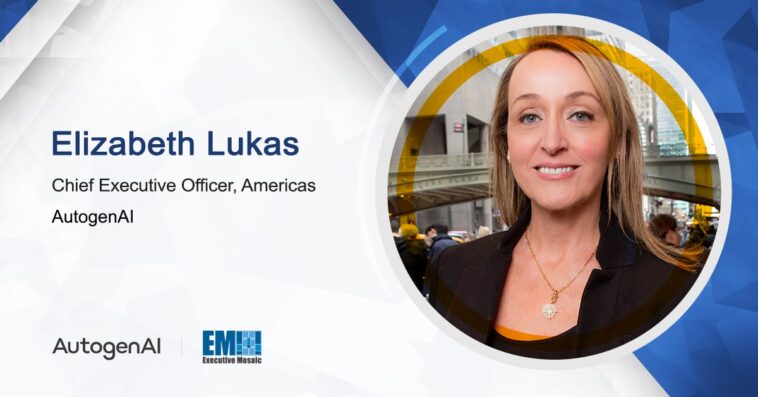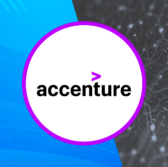The use cases for artificial intelligence don’t stop multiplying in the government contracting industry and since its founding in 2021, AutogenAI has developed a new one: using AI to assist the proposal writing process. Noted business leader Elizabeth Lukas came aboard the company last fall, lending her strategic management style and business development acumen to the evolving organization as its Americas CEO.
Prior to AutogenAI, Lukas launched the stateside wing of personal training start-up Decoded and has held senior-level positions in advertising and beyond.
Recently, we sat down with Lukas to gain an understanding about AutogenAI’s unique offerings and inquire what the company’s performance tells us about the federal marketplace.

If you’re in GovCon and care about AI, it’s essential you register to attend the industry’s most talked about AI event of the year: Potomac Officers Club’s 5th Annual AI Summit. This defense sector-focused, March 21st conference features speakers from DOD’s CDAO, DARPA and more, along with a wealth of intimate networking opportunities.
Where are you seeing opportunities for expansion in AutogenAI’s portfolio? What new capabilities or markets are you eyeing?
AutogenAI is a revolutionary tool designed to assist organizations in securing more work by enhancing their response process to requests for proposals. By deploying advanced artificial intelligence technology, AutogenAI enables these organizations to craft bids and proposals at an accelerated pace, without compromising on quality or effectiveness.
Marrying the power of AI with an organization’s existing content — including previous bids, marketing materials, annual reports, and sales collateral — our platform crafts compelling proposals that not only increase efficiency but also enhance win rates. Our software takes into consideration your organization’s documents, even linking back to referenced materials, to provide comprehensive, high-quality proposals. This unique blend of speed and quality, enabled by generative AI, offers businesses a competitive edge in their respective industries.
We are experiencing rapid growth in the U.S. market, accelerated thanks to our recent Series B investment round, provided by industry giants Salesforce Ventures and Spark Capital. In today’s competitive business landscape, companies are actively seeking secure enterprise solutions that not only augment their existing teams, but also propel their growth. They need innovative tools that can streamline operations, enhance productivity and drive business success. AutogenAI is at the forefront of meeting this demand, offering cutting-edge AI solutions that are secure, reliable and designed to support enterprises as they scale. Our commitment to delivering high-quality, specialized solutions is what sets us apart.
In which applications are you seeing the highest demand for AI/ML from your federal customers, and can you explain what’s driving that demand?
We are a specialist AI tool with a primary focus on generating winning proposals. However, we have noticed a significant trend in our client base.
Our federal clients show the highest demand for our services. They are increasingly seeking domain-specific AI solutions to meet their unique needs and challenges. This trend indicates a growing recognition of the value and potential of AI in the federal sector. It also underscores the importance of providing tailored AI solutions that can address the specific requirements and complexities of different domains.
What are some of the key barriers that remain in widespread federal AI adoption, and how do you think we can overcome them?
All organizations face challenges in adopting new technologies. However, public entities tend to be less agile than their private sector counterparts, owing in part to their established practices and processes. This underscores the challenges that can arise when rapid technological advancement outpaces the regulatory frameworks in place.
The adoption of AI in government has been slow to take off compared to the private sector. The AI landscape is continuously evolving, with a diversity of players stemming from large and established technology companies to AI start-ups. A substantial amount of AI knowledge exists within these small, relatively new organizations, but they have limited exposure to government work and face challenges breaking into this industry. Government entities need to engage these emerging participants, both to utilize their significant expertise and to foster the growth of AI.
Also, large language models, a relatively new addition to the technological landscape, represent a significant advancement in AI. They analyze, interpret and generate human language in a way that is remarkably similar to how humans themselves process language. However, these large language models are cloud-based systems. This offers numerous advantages, such as scalability, flexibility and cost-effectiveness, but it also presents certain challenges, particularly when it comes to federal applications.
How has GovCon changed since you began your career, and what’s your take on the market now?
The current market is more dynamic and challenging than ever before. The competition is intense, and companies need to constantly innovate to stay ahead of the curve. The government’s needs are also changing rapidly, and contractors need to be agile and adaptable to meet these evolving requirements. Luckily, there are plenty of opportunities for those who are willing to adapt. The government is always in need of goods and services, and there is a constant demand for contractors who can deliver high-quality solutions.
In my opinion, the future of the GovCon sector is bright. While the market may be more competitive and challenging, it is also more exciting and rewarding. The key to success in this industry is to stay abreast of the latest trends and technologies, and to constantly strive for excellence in everything you do.






